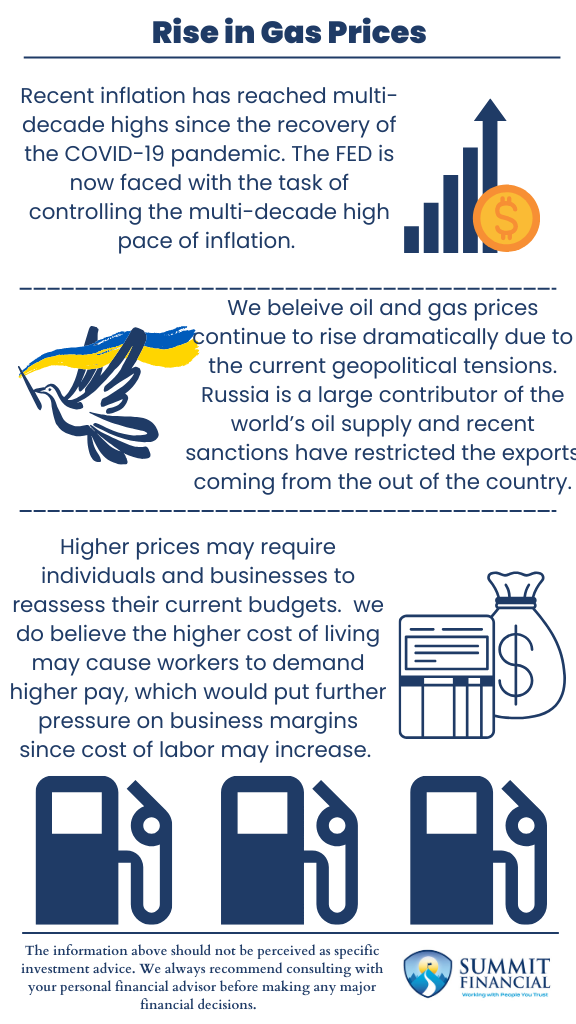If you have been to the gas station lately then you most likely noticed the higher-than-normal cost to fill up your tank. Have you noticed other price increases in your grocery or utility bills? The COVID-19 pandemic required the federal government to provide massive assistance, which included direct payments to citizens and drastic government spending. The Federal Reserve has been printing money to afford these costs, which decreases the value of the U.S. Dollar.
The more support that was provided, the more the dollar was devalued. While some of these actions were necessary to keep the economy alive, the FED is now faced with the task of controlling the multi-decade high pace of inflation. We believe their primary tool will be tightening policy by raising the fed funds interest rates in the coming months potentially.
Why is the Price of Gasoline Rising?
However, we believe other issues have arisen that caused inflation to continue rising, especially gas and oil prices. The Russia-Ukraine conflicts have created geopolitical tensions that are impacting energy prices. Russia is a large contributor of the world’s oil supply and recent sanctions have restricted the exports coming from the out of the country.
This lack of supply has caused energy prices to rocket higher. The prospect of a major war has had very negative impacts on the market, and consumers are seeing the impact at the pump.
Wars typically cause high inflation since additional resources and funds are allocated to this need rather than supporting other areas of the economy. If the geopolitical issues are resolved, we may see energy prices come back down, but we do expect a higher-than-average level of inflation still over the next few quarters.

The Impact of Gas Prices on Your Budget
Individuals and businesses may need to plan for these increased costs within their spending budgets. Individuals who drive further for work or those planning a road trip may need to adjust their spending plans to include higher gas prices. This means that other expenses may need to be reduced, or worst-case scenario would be reducing retirement savings to afford these higher costs.
Businesses may have a tough time adjusting to this cost since it is one of the largest expenses for many companies. Company vehicles and fleets may be more expensive, and we could very well see an increase in shipping costs. This will cause pressure on the company’s profit margins, so they potentially may make less revenue during this high inflationary time.
Also, we do believe the higher cost of living may cause workers to demand higher pay, which would put further pressure on business margins since cost of labor may increase.
Gas Prices and Inflation – Key Takeaways
- Recent inflation has reached multi-decade highs since the recovery of the COVID-19 pandemic.
- We believe oil and gas prices continue to rise dramatically due to the current geopolitical tensions.
- Higher prices may require individuals and businesses to reassess their current budgets.
Speak With a Trusted Advisor
If you have any questions about your investment portfolio, retirement planning, tax strategies, our 401(k) recommendation service, or other general questions, please give our office a call at (586) 226-2100. Please feel free to forward this commentary to a friend, family member, or co-worker. If you have had any changes to your income, job, family, health insurance, risk tolerance, or your overall financial situation, please give us a call so we can discuss it.
We hope you learned something today. If you have any feedback or suggestions, we would love to hear them.
Best Regards,
Zachary A. Bachner, CFP®
with contributions from Robert Wink, Kenneth Wink, and James Wink
If you found this article helpful, consider reading:
Sources:


